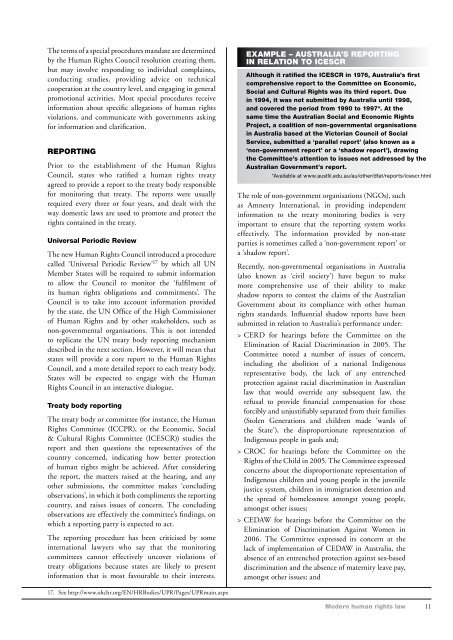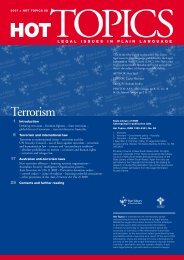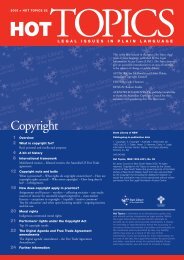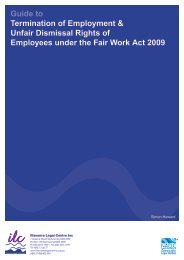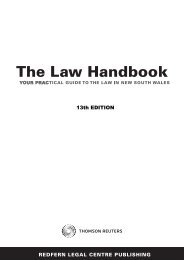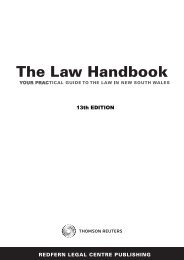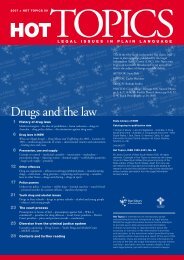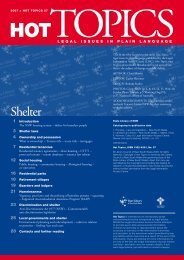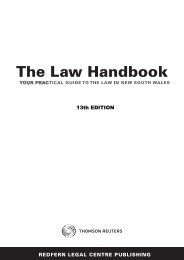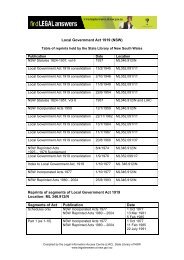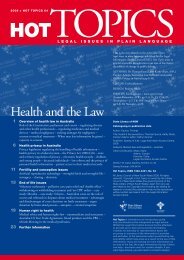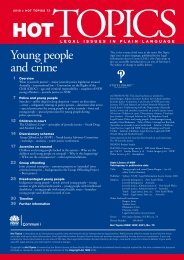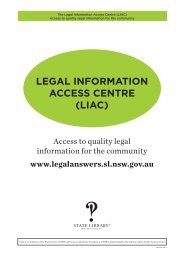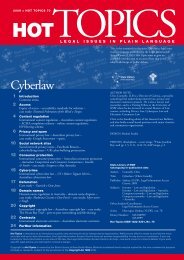Hot Topics - Issue 65: Human Rights - Legal Information Access ...
Hot Topics - Issue 65: Human Rights - Legal Information Access ...
Hot Topics - Issue 65: Human Rights - Legal Information Access ...
Create successful ePaper yourself
Turn your PDF publications into a flip-book with our unique Google optimized e-Paper software.
The terms of a special procedures mandate are determined<br />
by the <strong>Human</strong> <strong>Rights</strong> Council resolution creating them,<br />
but may involve responding to individual complaints,<br />
conducting studies, providing advice on technical<br />
cooperation at the country level, and engaging in general<br />
promotional activities. Most special procedures receive<br />
information about specific allegations of human rights<br />
violations, and communicate with governments asking<br />
for information and clarification.<br />
rePOrTinG<br />
Prior to the establishment of the <strong>Human</strong> <strong>Rights</strong><br />
Council, states who ratified a human rights treaty<br />
agreed to provide a report to the treaty body responsible<br />
for monitoring that treaty. The reports were usually<br />
required every three or four years, and dealt with the<br />
way domestic laws are used to promote and protect the<br />
rights contained in the treaty.<br />
universal periodic Review<br />
The new <strong>Human</strong> <strong>Rights</strong> Council introduced a procedure<br />
called ‘Universal Periodic Review’ 17 by which all UN<br />
Member States will be required to submit information<br />
to allow the Council to monitor the ‘fulfilment of<br />
its human rights obligations and commitments’. The<br />
Council is to take into account information provided<br />
by the state, the UN Office of the High Commissioner<br />
of <strong>Human</strong> <strong>Rights</strong> and by other stakeholders, such as<br />
non-governmental organisations. This is not intended<br />
to replicate the UN treaty body reporting mechanism<br />
described in the next section. However, it will mean that<br />
states will provide a core report to the <strong>Human</strong> <strong>Rights</strong><br />
Council, and a more detailed report to each treaty body.<br />
States will be expected to engage with the <strong>Human</strong><br />
<strong>Rights</strong> Council in an interactive dialogue.<br />
treaty body reporting<br />
The treaty body or committee (for instance, the <strong>Human</strong><br />
<strong>Rights</strong> Committee (ICCPR), or the Economic, Social<br />
& Cultural <strong>Rights</strong> Committee (ICESCR)) studies the<br />
report and then questions the representatives of the<br />
country concerned, indicating how better protection<br />
of human rights might be achieved. After considering<br />
the report, the matters raised at the hearing, and any<br />
other submissions, the committee makes ‘concluding<br />
observations’, in which it both compliments the reporting<br />
country, and raises issues of concern. The concluding<br />
observations are effectively the committee’s findings, on<br />
which a reporting party is expected to act.<br />
The reporting procedure has been criticised by some<br />
international lawyers who say that the monitoring<br />
committees cannot effectively uncover violations of<br />
treaty obligations because states are likely to present<br />
information that is most favourable to their interests.<br />
exaMPle – ausTralia’s rePOrTinG <br />
in relaTiOn TO icescr<br />
although it ratified the icescR in 1976, australia’s first<br />
comprehensive report to the committee on economic,<br />
social and cultural <strong>Rights</strong> was its third report. Due<br />
in 1994, it was not submitted by australia until 1998,<br />
and covered the period from 1990 to 1997*. at the<br />
same time the australian social and economic <strong>Rights</strong><br />
project, a coalition of non-governmental organisations<br />
in australia based at the Victorian council of social<br />
service, submitted a ‘parallel report’ (also known as a<br />
‘non-government report’ or a ‘shadow report’), drawing<br />
the committee’s attention to issues not addressed by the<br />
australian government’s report.<br />
*Available at www.austlii.edu.au/au/other/dfat/reports/icescr.html<br />
The role of non-government organisations (NGOs), such<br />
as Amnesty International, in providing independent<br />
information to the treaty monitoring bodies is very<br />
important to ensure that the reporting system works<br />
effectively. The information provided by non-state<br />
parties is sometimes called a ‘non-government report’ or<br />
a ‘shadow report’.<br />
Recently, non-governmental organisations in Australia<br />
(also known as ‘civil society’) have begun to make<br />
more comprehensive use of their ability to make<br />
shadow reports to contest the claims of the Australian<br />
Government about its compliance with other human<br />
rights standards. Influential shadow reports have been<br />
submitted in relation to Australia’s performance under:<br />
> CERD for hearings before the Committee on the<br />
Elimination of Racial Discrimination in 2005. The<br />
Committee noted a number of issues of concern,<br />
including the abolition of a national Indigenous<br />
representative body, the lack of any entrenched<br />
protection against racial discrimination in Australian<br />
law that would override any subsequent law, the<br />
refusal to provide financial compensation for those<br />
forcibly and unjustifiably separated from their families<br />
(Stolen Generations and children made ‘wards of<br />
the State’), the disproportionate representation of<br />
Indigenous people in gaols and;<br />
> CROC for hearings before the Committee on the<br />
<strong>Rights</strong> of the Child in 2005. The Committee expressed<br />
concerns about the disproportionate representation of<br />
Indigenous children and young people in the juvenile<br />
justice system, children in immigration detention and<br />
the spread of homelessness amongst young people,<br />
amongst other issues;<br />
> CEDAW for hearings before the Committee on the<br />
Elimination of Discrimination Against Women in<br />
2006. The Committee expressed its concern at the<br />
lack of implementation of CEDAW in Australia, the<br />
absence of an entrenched protection against sex-based<br />
discrimination and the absence of maternity leave pay,<br />
amongst other issues; and<br />
17. See http://www.ohchr.org/EN/HRBodies/UPR/Pages/UPRmain.aspx<br />
Modern human rights law 11


